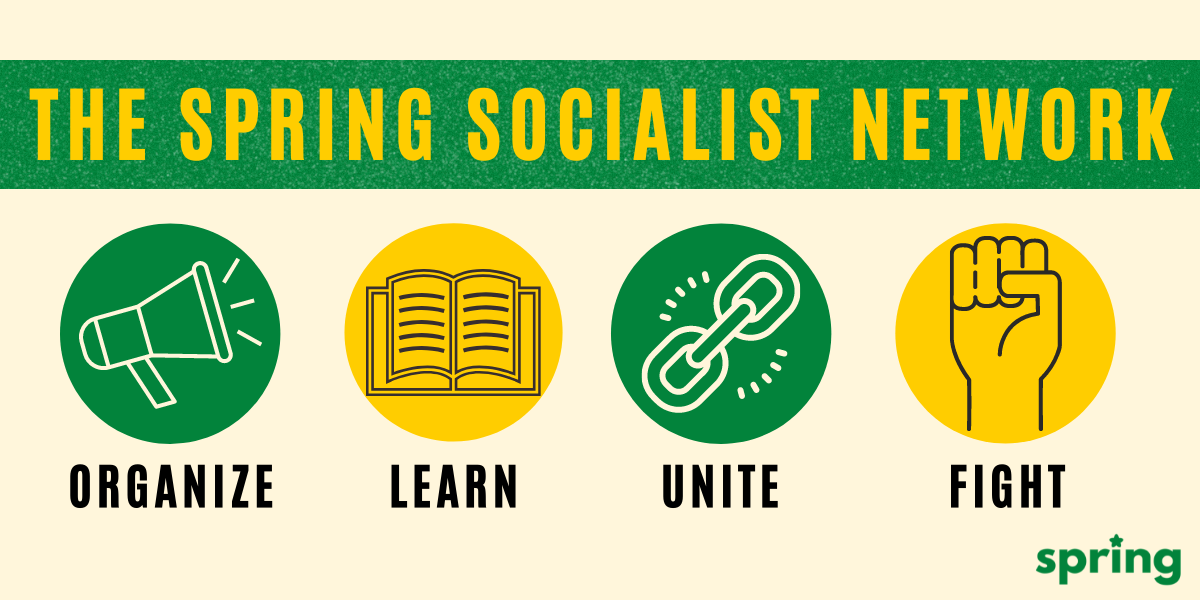What does it mean to be a racialized member of the working class?
This was a core question that guided discussion led by members of the Spring Socialist Network’s BIPOC Leadership Development Program. After months of workshops and leadership training, members of the program unpacked racialized experiences of working class struggles.
One member, Patricia Meyer, came to an important but upsetting conclusion.
“A lot of organizing leaves out racialized people,” she said in an interview with rabble.ca.
Meyer brought forth this reflection after the evening of Friday, July 22, where she and other members of Spring’s BIPOC leadership program held an educational session. Meyer and the panelists used this event as an opportunity to highlight how racialized folks are sometimes left behind in labour struggles.
“The working class fight is about who is being compensated, who has access to the labour market and who doesn’t,” said Adam Lee, another member of the BIPOC Leadership Development Program, in an interview with rabble.ca.
Meyer and Lee pointed to information from the 2022 Racial Justice Primer that Justice for Workers released as foundational knowledge to understanding the issues of the racialized working class.
“Racism in the labour market means Indigenous, Black, migrant and other workers of colour are forced into the worst jobs, with the least protections, lowest wages, and highest precarity,” the primer reads. “The decent work agenda is not only urgent and essential — it is fundamentally a matter of racial and gender justice.”
Larger political issues affecting working class cannot be ignored
To win racial and gender justice while fighting for decent work, the larger political issues that affect the working class must be acknowledged, Meyer and Lee say.
The Justice for Workers primer highlights the significant barriers racialized people face when accessing protections won by collective bargaining.
The primer reads:
“Black, recent immigrants and other workers of colour are more likely to be in involuntary part- time, temporary and contract employment … At the same time, women workers are often compelled to choose part-time employment because they continue to shoulder the majority of family caring responsibilities for children, elderly parents, and other loved-ones. For women of colour facing discrimination in the labour market, this means getting the worst of the part-time jobs, through temp agencies, gig work, and other unstable casual contracts.”
These types of jobs are less likely to be unionized, according to the primer. Justice for Workers writes that this puts workers of colour, specifically women, at a permanent structural disadvantage.
Who is organizable?
The question of who is seen as ‘organizable’ is pushing these divisions within the working class, Lee says. They explain that when people fail to connect issues outside of the workplace with labour struggles, people can be left out of organizing.
“When I think about organizing migrant farmworkers, for example, these are folks who for a long time were seen as ‘not organizable,’” Lee said. “People thought it was a waste of time to organize them because they’re hemmed in through a specific part of immigration law. People wondered, ‘is this going to be something that really does things in the realm of labour?’”
The struggle does not end at good contracts, according to Meyer. She says that legislation that protects the most vulnerable member of the working class will benefit everyone.
“People often think, ‘that’s not for me,’” Meyer said. “But the things that we fight for benefit people on all levels and will benefit you as well.”
Connecting labour and community struggles
Lee recalled an experience that helped them connect labour struggles to community struggles. While attending a migrant rights rally, Lee explained that they were inspired by the migrant workers who spoke at the action.
“They had actually spoken up against their employers at great risk to themselves,” Lee said. “These workers are organizing the workplace. They’ve talked to their co-workers about this. They fought the fight in the workplace and it’s not just about what we need in the workplace. To be treated better in the workplace, what else do we need? For one, we need changes to immigration law.”
The Temporary Foreign Work Program in Canada, for example, exposes workers to abuse from their employer and speaking up means risking deportation.
Lee says that beyond immigration law, working class issues also stretch to things like housing and strong social services.
Expanding labour struggle beyond the workplace
Lee urges organizers to keep demands strong, because when they get watered down, it is racialized folks who will be left behind first.
For example, they explain that if the labour movement gave into pressures that claim 10 paid sick days are too many, it will be those who work frontline jobs and cannot afford days off who will suffer first. These people are often racialized.
Community struggles and labour struggles cannot be separated, according to Meyer. She says that issues like transport, for example, connect to how people can access their workplace.
“We need to make sure of things beyond employees being paid well,” Meyer said. “It’s about things like access to health care. Paid sick days are great but what’s even better is when you have a comprehensive health care system that will allow you to take preventative measures.”
As Lee and Meyer unpacked the experiences of the racialized working class, they made it clear that many racialized workers do not think of their existence narrowly. Securing justice for workers needs to push past labour laws. Expanding the idea of labour struggle to struggles beyond the workplace will ensure that no one is left behind.



